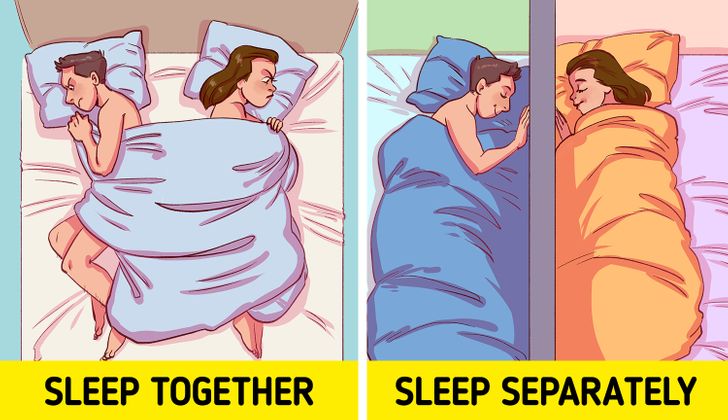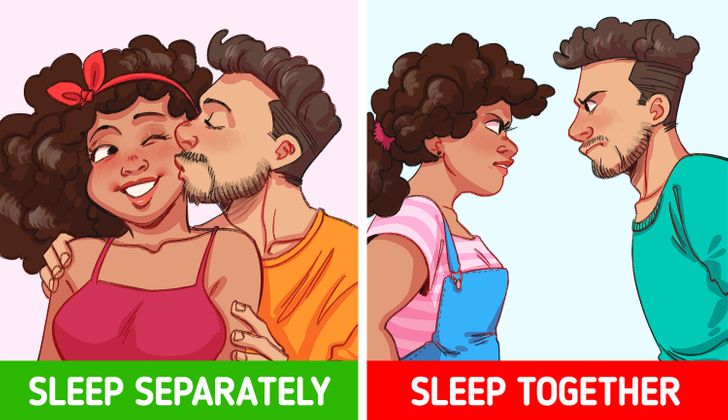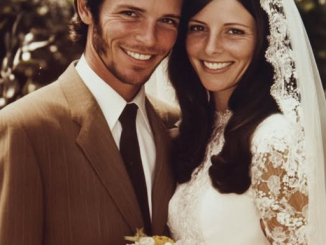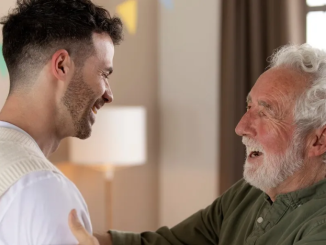According to a survey, only 14% of couples sleep in separate beds every night. And while many of us might believe in the saying “couples who sleep apart grow apart” there are studies that show the opposite is actually true.
We at Bright Side believe that there are no wrong or right sleep arrangements, because to some, sleeping in different beds can be as pleasing as for others sharing a bed with their partner.
A poor night’s sleep can turn lovers into fighters.

According to research, sharing a bed with a partner that has restless sleep behavior can deprive you of 49 minutes of sleep each night. And, when one partner doesn’t get a proper night’s sleep because of the other, it will most likely result in a conflict between them the next day.
Actually, the study even confirmed that couples who tend to have a poor night’s sleep have more severe and more frequent fights than those who wake up well-rested. People who get a good night’s sleep, on the other hand, are more likely to be in a good mood, have lower stress levels, and be more patient.
Resenting your partner because you can’t get a good night’s sleep can be destructive to the relationship.

Snoring, fidgeting, and bed or blanket hogging are just a few of many reasons why some couples choose to sleep in different beds or even in different bedrooms. Lying awake listening to your partner snoring while you beat yourself up to fall asleep can lead to a build-up of anger, tension, and resentment toward your partner.
According to Jennifer Adams, author of Sleeping Apart Not Falling Apart, sleeping in a separate bedroom can even help a relationship thrive because both partners are not sleep deprived.
Each partner can tailor their sleeping conditions to their heart’s content.

Tina Cooper, a licensed social worker, sleeps in different bedrooms with her partner because of their opposite sleeping habits. “I’m a night owl, he’s an early bird. I need soothing sounds to fall asleep, and he likes silence. He likes a hard mattress, and I like soft and full of pillows. And because I don’t like the early day’s sunlight, my boyfriend gave me the master bedroom which gets less light and he has the second largest room that gets the sunrise he loves.”

How you spend the nighttime in your shared bedroom with your partner can also influence your daytime functioning, marital satisfaction, and psychological and physical health. And when 2 people with different bedtime preferences and nighttime schedules end up together, changing themselves just to please their partner’s needs might harm their relationship in the long run.
Sleeping in different bedrooms with your partner means that the 2 of you will have a place just for yourselves where you can relax after an exhausting day. This way, both of you can satisfy your needs without tiptoeing around and worrying about whether your partner might wake up because you want to watch the latest episode of your show before bed.
Even if you don’t remember waking up, disturbed sleep can have a negative impact on your overall health.

During the night, our brain cycles through the stages of sleep several times: light sleep, deep sleep, and REM (Rapid eye movement sleep). But when you interrupt the cycle by waking up during the night, it means that your brain spends more time in the light sleep stage and misses out on REM. And without sufficient REM your emotional well-being and cognitive performance suffer.
Interrupted sleep can also have short and long-term health consequences, like hypertension, weight-related issues, mental health problems, reduced quality of life, and other health-related issues.
People on Reddit share why they decided to sleep separately with their partner.

- “Because a good night’s sleep is more romantic than sharing a bed. I snore and toss and turn. He gives off literal village levels of heat in his sleep and I can’t stand the heat. I read, he can’t stand light. We keep different hours to an extent. A million reasons. We get along so much better this way.” — crankyweasels
- “My partner and I have completely separate bedrooms. We ’sleepover’ occasionally in each other’s rooms. However, we both sleep exponentially better apart. He’s a night owl and I’m an early bird. He wants only one sheet on him, I want 10 lbs of blankets. In addition, having a separate room allows me to decorate it however I want, have my own personal space, and keep it to the level of cleanliness I prefer. People look at us sideways when I mention the separate rooms thing, but it’s been a game-changer.” — eriasana
- “Different sleep cycles due to different work schedules. We are still madly in love and we both agreed to this because it’s the best for both of us.” — AFishInATank
- “Early in our relationship, 90% of our fights occurred in the bedroom. I like to sleep in a cold room with the fan on and white noise like a box fan. I also like to go to sleep with the TV on. She likes to sleep in a warm, still, cave in complete silence and darkness. We started sleeping in separate rooms and all of a sudden 90% of our fights stopped. Also, because we were getting real sleep, other fights turned more into heated discussions.” — ttc8420
What are your sleeping arrangements with your partner? Do you believe sleeping in different beds can help a relationship thrive?
I Planned the Perfect Surprise Party, But My Husband’s Reaction Left the Room in Complete Silence
When Maria planned a surprise party for her husband’s 40th birthday, she thought it would be a night to remember for all the right reasons. She invited close friends and family, decorated the house, and made sure everything was perfect for his big day. But when the doorbell rang, something unexpected happened.

My husband’s 40th birthday was coming up, and I wanted to throw him a surprise party. I told him I would be out of town on his birthday, and we agreed to celebrate on another day.
The night before his birthday, I pretended to pack my bags and leave for the airport. But instead of traveling, I stayed overnight at my friend Karen’s house.

As I packed, Karen asked, “Are you sure this will work?”
“Absolutely,” I said. “Tom thinks I’m visiting my sister.”
The next day, I got up early to prepare everything. Tom usually came home around 6 p.m., so I invited friends and family to arrive at 5. By 4:45, guests began showing up, starting with his brother, Jim.

“Need any help?” Jim asked, carrying a box of decorations.
I handed him streamers and said, “Sure, hang these up.”
Soon, Tom’s best friend, Dave, arrived with his wife, Lisa. “Wow, Maria, you’ve outdone yourself,” Lisa said, admiring the decorations.

“Thanks! Can you help with the balloons?” I asked. Everyone worked together, and by 5:30, the house looked amazing, with streamers, balloons, and a big banner that said, “Happy 40th, Tom!”
At 5:45, I gathered everyone in the kitchen. “Tom will be here soon. Let’s hide,” I said, feeling excited. We turned off the lights and found hiding spots, waiting in the dark. My heart raced when I heard the key in the lock.

The door opened, but instead of Tom, I heard a woman’s voice. “Do you think he’ll like it?”
My heart sank. Who was this woman? For a second, I thought Tom was cheating on me. The lights came on, and we all gasped.

Standing in the doorway was a young couple, just as shocked as we were. The woman held a suitcase, and the man had a set of keys.
“Who are you?” I asked.
“Who are we? Who are you?” the woman responded, equally confused.
Jim stepped forward. “We’re here for a surprise party. Who are you?”
The man replied, “We rented this house on Airbnb.”

My face went pale. “Airbnb? This is our house!”
Dave scratched his head. “Tom must have listed it after Maria said she was leaving.”
The woman looked at me sympathetically. “Oh no, we didn’t know. We’re so sorry. We’ll leave right away.”
“No, it’s okay,” I said, trying to stay calm. “Let’s figure this out.”

The couple, still confused, stepped inside, and everyone started whispering, trying to understand what happened.
Karen came over and whispered, “Maria, what’s going on?”
“I have no idea,” I whispered back. “Tom must have put the house on Airbnb when I told him I’d be away.”

Tom’s sister, Susan, spoke up. “Let’s all sit down and talk this out.”
We moved to the living room, the party decorations now feeling out of place. The couple introduced themselves as Jake and Emily.
“We’re really sorry,” Jake said. “We thought the house was empty.”
Emily nodded. “We didn’t mean to crash your party.”
I smiled. “It’s not your fault. This is just a big mix-up.”

I called Tom, and he answered cheerfully. “Hey, honey! I thought you’d be on your flight.”
“Tom,” I said, trying to stay calm, “did you list our house on Airbnb?”
There was a pause. “Uh, yeah. I thought we could make some extra money since you were out of town.”
I took a deep breath. “Tom, I’m not out of town. I was planning a surprise party for you. Now, we’ve got guests and an Airbnb couple here.”

There was silence before Tom finally said, “Oh no, I’m so sorry. I didn’t know.”
I looked at Jake and Emily, who sat awkwardly on the couch. “What do we do now?”
“I’m coming home. We’ll figure it out,” Tom said.
I turned to everyone. “Tom’s on his way. We’ll sort this out soon.”
Jake stood up. “We can find another place to stay.”
Lisa shook her head. “No, stay. There’s plenty of food and drinks. Join us.”

Emily smiled. “Are you sure?”
“Absolutely. The more, the merrier,” I said.
Tom arrived fifteen minutes later, looking sheepish. “I’m really sorry,” he said. “I just wanted to save money for a vacation.”
Susan laughed. “Well, you certainly surprised us.”
Jake and Emily decided to stay, and soon everyone was laughing and having a great time.

As the night went on, I smiled. Despite the chaos, it turned out to be a night none of us would forget. And as for the vacation, Tom and I would definitely be taking one, with a funny story to tell for years to come.



Leave a Reply